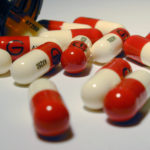
To take or not to take antibiotics? This is a question I, as a practitioner of Chinese medicine, am often asked by my clients. I like to answer, yes, as long as you have a bacteria and not a virus.
It is often difficult to know if you have a bacterial or viral infection, especially if you’re experiencing symptoms related to a common cold, flu, sinus, throat or chest infection. If that is the case, other factors besides medications will influence your recovery. These can be rest and supportive nutrition. Antibiotics should perhaps not be the first port of call for treatment of common cold symptoms. It can be beneficial to hold off on popping a pill giving the immune system a chance to initially deal with whatever bug you’ve got.This approach can help with clarity of viral versus bacterial symptoms. Hopefully this will reduce the risk of developing anti-biotic resistance, which seems to be an increasing problem.
Why we’re anti over-prescription of antibiotics
It has recently been reported by the Medical Association of Australia that antibiotics are being over-prescribed. Antibiotics are useless and not necessary if the illness is actually a virus and not bacterial. The problem with over prescription is the creation of antibiotic resistant super bugs. This issue is developing into a big worldwide health problem. Especially for the most vulnerable, such as the elderly, infants and those with chronic health issues.
So do you have a virus or a bacteria?
It’s very difficult to know for sure because often a viral infection will have very similar symptoms. Sometimes the same as a bacterial infection. The only way to confirm the cause of infection is through tests such as a blood, urine and stool tests. Or a swab of your local culture. This is expensive and time consuming. Often a doctor or health practitioner will make a judgement based on your presenting symptoms, your health history and their experience. If serious symptoms present themselves your doctor will hopefully recommend a thorough screening process straight away to find out for sure, so appropriate treatment can be prescribed as soon as possible.
Virus vs Bacteria – Some basic guidelines (by no means definitive)
| Virus | Bacteria |
| Systemic infection (whole body) | Local (possibly with systemic fever) |
| Minimal, clear or light yellow, mucous | Yellow, green or brown mucous & phlegm |
| Often short term 3-4 days | Can often develop after virus extending the illness |
| Red sore throat | Sore throat with white specs |
What’s the best course of action?
If you are worried about your symptoms, check in with your GP for advice. Especially as the 2017 flu (influenza) season has been reported to be particularly bad. But remember, it’s important to appreciate that you may walk out of your doctor’s surgery without any medicine. Antibiotics can be very effective in treating bacteria, but not a virus. The flu, for instance, is caused by a virus and can not be treated with antibiotics. On top of this there is evidence to suggest antibiotics may have a negative impact on the health of your important gut flora and microbe activity. This can compromise your digestion and contribute to conditions such as thrush (candida) or irritable bowel syndrome. There is good evidence to suggest probiotic treatment can help with these issues. They should be considered after a course of antibiotics as part of the recovery from the illness.
if your symptoms are mild enough to manage without prescribed medications, or your doctor is confident you have a virus, hold off on taking antibiotics.
https://gardenvaletcm.com.au/articles/common-cold/

Nic Conquest
by Nick Conquest (September 2017)
References:
http://www.abc.net.au/news/2017-07-10/australians-overloaded-with-antibiotics-research/8693600
http://www.apa.org/news/press/releases/2017/02/antibiotics-expectations.aspx
https://www.csicop.org/si/show/the_superbug_crisis_false_beliefs_about_antibiotics_are_a_global_threat
The Chinese prescription lianhuaqingwen capsule exerts anti-influenza activity through the inhibition of viral propagation and impacts immune function Yuewen Ding†, Lijuan Zeng† Runfeng Li†, BMC Complementary and Alternative MedicineBMC series – open, inclusive and trusted2017
http://www.acupuncture.org.au/Portals/0/Evidence%20study/Acupuncture%20Evidence_plain%20English%20Web%20version_17_Feb.pdf?ver=2017-02-22-171448-550
Probiotics reduce symptoms of antibiotic use in a hospital setting: A randomized dose response study
Arthur C.OuwehandaCaiDongLianbXuWeijianbMorganStewartcJiayiNidTadStewarteLarry E.Millerc
http://www.sciencedirect.com/science/article/pii/S0264410X13015879




